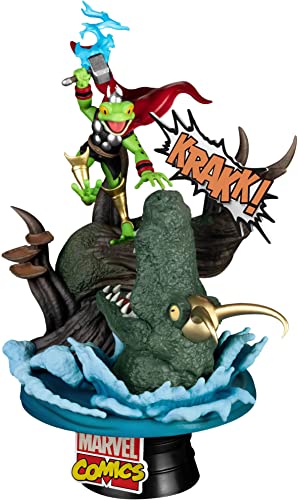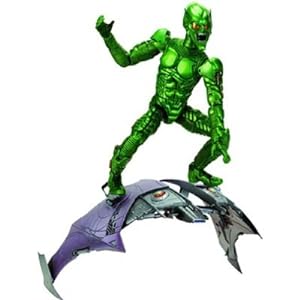With the San Diego Comic-Con convention starting this week, promotion for next year's much-anticipated reboot
is expected to hit hard; including a teaser debut. And now, chatting recently with the L.A. Times'
, director Marc Webb weighed in essentially on escaping Sam Raimi's previous trilogy among other things.
"I feel we have certain obligations to the iconography of Spider-Man, which is based mostly in the comics. The other thing is Spider-Man has a lot of different incarnations in the comics. While there are certain mainstays —
a kid who gets bitten by a spider, he’s an outsider, the death of his Uncle Ben helps endow [him] with the mentality of a hero — those things remain the same but there’s also room for interpretation. He’s been around since the 1960s. The wealth of material here — whether it’s story or character — is really profound but I also feel it’s my responsibility to reinvent it in some ways."
On how we'll see that reinvention manifest...
" Peter Parker is a science whiz. If you look back to the early Stan Lee and Steve Ditko comics, he’s a nerd with big glasses. The idea of what a nerd is has changed in 40 or 50 years. Nerds are running the world. Andrew Garfield made a movie [called "The Social Network"] about it. Nerds are no longer pariahs and knowing how to write computer code is longer a [mocked] quality. What was important in those early comics was this notion that Peter Parker is an outsider and how we define that in a contemporary context. That, I think, was one of the challenges for us — getting Peter Parker’s outsider status to be current. Peter Parker is a real kid. He’s not a billionaire. He’s not an alien. He’s a kid who gets picked on and gets shoved to the outside. The 90-pound weakling, that’s who Spider-Man is when he gets bit. So much of the DNA of the character is the fact that he was a kid when he got bit. He is imperfect, he is immature and has a bit of a punk rock instinct. In his soul he’s still a 90-pound weakling even after [the transformative bite]."

On feedback from fans suggesting that Garfield wasn't bulky enough...
"Andrew went through an incredibly intense training. When you see the before and then see the after — he is not a weakling. He is a lithe character. We wanted to make it more about agility than this sort of Atlas-like power figure. He’s not Superman. He was a unique figure in Marvel Comics and all of comics. He was this kid, too, and we want to keep that consistent even to some extent when the costume is on. I love a lot of the “Ultimate Spider-Man” artwork and story lines, there’s a lot more of an adolescent, playful quality. And I think that’s a big part of Spider-Man universe and hasn’t really been explored cinematically before."
On other differences we'll see between this film and Raimi’s trilogy...
"One of the things we tried to do was keep the stunts more grounded physically and that was a huge challenge because you have a character whose abilities are superhuman. How do you do that in a way that’s convincing and real? We had a really great stunt team, the Armstrongs, who were vigilant in the creation — with Andrew — of a physical language that felt grounded but also extraordinary. We spent months and months and months developing rigs so he could swing in a way that wasn’t computer-generated. Obviously there’s going to be enhancements and CG [sequences], but it’s based in a physical reality and that’s a new technique [for this film brand]. When you walk out of the theater, I want the world you see to resemble what you saw on the screen. Part of the joy of cinema [is that] you make the impossible look real. I wanted it to be more grounded and more realistic and that went for the emotion of the scenes, the physical action and wardrobe. It’s less based in Steve Ditko world and probably closer visually and more influenced by “Ultimate Spider-Man” but it is also very much a world of our own devising."
On anything he can say about the film's villain...

"I have to dodge that question. I can tell you this much — it’s a new villain, something we haven’t seen before and villains help define the story in a very specific way. Marvel villains — and Spider-Man villains in particular– are rich and complicated and interesting and Rhys [Ifans] has done just a fantastic job in translating that and there will be a lot of new things to explore for the fans. They’re tragic in the Greek sense, meaning it’s a competing idea of what’s good. They’re not just guys, they’re people trying to do good or to do the right thing and on that journey that effort becomes subverted or manipulated or it sours. It makes for a much more compelling adversary. In the Marvel Universe, traditionally, the villains have more texture. This is open to interpretation because there are so many incarnations of the villains over the years and it varies, but the [tradition is there]. Tom Stoppard was on Charlie Rose’s show once and he said what makes great drama is competing ideas of what is good, and there’s no better mythological version of that than what you see in Marvel."
On whether stepping out of Raimi's films' shadow was his biggest challenge...
"We’ll have to see. The truth is I don’t know. For me, it’s enough of a reinvention that it is a different Peter Parker. In the comics there’s just ongoing sagas. Why can’t we do that cinematically? What the truth was: I like the other movies and I was a little bit skeptical but then I asked myself if I wanted to see [this new story and interpretation] and the answer was yes. I was interested in that universe and I believe I have something to say that’s different enough to be worth my time. I think there’s a lot to explore as far as the adolescent quality of this superhero and just seeing him in high school again gives you so much to mine in terms of behavior and story and the contemporary mythological context of high school and what it is."
On whether Comic-Con is a "make-or-break" moment for him...
"Legends of Hall H — people should write songs about it. A lot of our credibility is based on fan perception in some way. I’m really excited to connect with the fans. I feel like we’ve been a little bit under the radar in terms of our communication. I think it’s a great way to announce the new qualities that we’re putting out there and just connect with the audience in a way that we haven’t before."






















